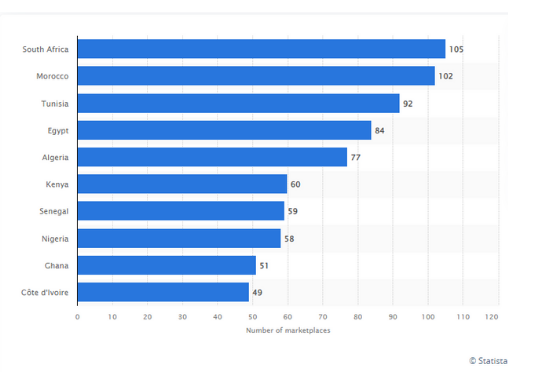
Demand for seamless, convenient way of shopping increase growth of e-Commerce in Africa
The electronic commerce (e-Commerce) transaction of goods and services between business-to-consumer (B2C), business-to-business (B2B), consumer-to-consumer, and consumer-to-business, has become rampant in this digital age. Innovations in digital payments has transitioned the retail industry in Africa and across the world.
A recent report by Visa showed that the top market contributors to e-Commerce in Sub-Saharan Africa over the last 3 years were South Africa, Nigeria, and Kenya, with Ghana also showing growth, having replaced Kenya in the top three contributors in 2020. The report further stated that although Sub-Saharan Africa is one of the smallest regions of e-Commerce globally, it shows steady growth potential. During lockdown, the region saw new e-Commerce users rise by 5% when compared to the active base in the previous year.
Another report by Statista stated that in 2020, South Africa was the country with the largest number of online marketplaces for physical goods in Africa, with four North African countries; Morocco, Tunisia, Egypt, and Algeria, following suit. In total, Africa counted at least 631 B2C online marketplaces for physical goods.
African countries with the highest number of online marketplaces as of 2020
Earlier this year, another report by Research and Markets stated that South African e-Commerce industry will reach $7.9 billion by 2027 due to an increase in penetration of smart devices and the growing internet connectivity, as well as the increasing integration of e-Commerce platforms with various advanced technologies, such as cloud computing, artificial intelligence and predictive analytics.
Multilateral development finance institution African Development Bank (AfDB), has also been intrumental in accelerating the e-Commerce industry in the continent. The institution recently approved a $1.5 million grant to Smart Africa Alliance to strengthen the policy environment for digital trade and e-Commerce across Africa. The funding would be used to assess policy gaps in the digital trade and e-Commerce ecosystems in 10 African countries; Côte d’Ivoire, Benin, Ghana, Liberia, Uganda, South Sudan, Zimbabwe, The Republic of Congo, São Tomé and Príncipe, and Democratic Republic of Congo.
According to ecommerceDB, Nigeria is the 33rd largest market for e-Commerce globally, with a revenue of $6.9 billion in 2021, placing it ahead of Denmark and behind Colombia. South Africa is the 41st largest market for e-Commerce with a revenue of $5 billion in 2021, placing it ahead of Iraq and behind Philippines; Kenya is the 54th largest market for e-Commerce with a revenue of $1.7 billion in 2021, placing it ahead of Sri Lanka and behind Hungary; and Egypt is the 39th largest market for e-Commerce with a revenue of $5.2 billion in 2021, placing it ahead of Philippines and behind Iran.
With an increase of 30%, the Nigerian e-Commerce market contributed to the worldwide growth rate of 15% in 2021, and with an increase of 19%, the South African e-Commerce market contributed to the worldwide growth rate of 15% in 2021 and with an increase of 44%; in the Kenya, the e-Commerce market contributed to the worldwide growth rate of 15% in 2021 and with an increase of 44%, the Egyptian e-Commerce market contributed to the worldwide growth rate of 15% in 2021. As new markets are emerging, e-Commerce growth in Africa and is expected to continue over the next years.
A perfect growth case at hand is the recent partnership between payments giant Mastercard and Cellulant, which will allow millions of Cellulant customers across Africa shop and pay online with global merchants wherever Mastercard is accepted. With this partnership, customers will be able to pay globally with a Mastercard virtual payment solution linked to the Cellulant wallet, Tingg. Mastercard's technology will enable consumers to shop online with or without a bank account, through a simple and secure payment experience.
Crossing the border to East Africa, Kenyan B2B e-Commerce startup Wasoko opened an innovation Hub in Zanzibar. This new Hub will focus on building world-class tech solutions that will drive Africa’s e-Commerce industry for years to come, becoming home to over 500 visionary engineers, product managers, UX designers and researchers from Africa and across the globe. The Wasoko Innovation Hub is the first private-public partnership between an African tech startup and the Zanzibar government for “Silicon Zanzibar” – a new government initiative to attract and relocate tech companies from across Africa to the island.
e-Commerce in the Middle East North Africa (MENA) region is also fast catching up with global powerhouses. Egypt, as the most populous Arabic country, represents one of the most diversified economies in the MENA region. The total revenue of e-Commerce in Egypt reportedly reached $5 billion in 2021. In line with the National e-Commerce Strategy, Egypt aspires to harness the power of e-commerce to help catalyze innovation, growth, and social prosperity in the digital economy. J&T Express (J&T), an international express logistics company, recently launched its network in Egypt, to accelerate e-Commerce growth in the MENA region and global delivery network to Africa markets beyond Asia and Latin America.
Pan-African e-Commerce giant Jumia has also helped millions of consumers and sellers to connect and transact. With over 1 billion people and 500 million internet users in Africa, Jumia believes that e-Commerce is making people's lives easier by helping them shop and pay for millions of products at the best prices wherever they live.
The demand for seamless, convenient way of shopping has seen significant growth of the e-Commerce ecosystem in Africa, consequently bringing an increase in e-Commerce funding and partnerships. Businesses across Africa are turning to e-Commerce as a channel to improve their sales, and compensate for the disruption to traditional offline channels. e-Commerce is also creating fresh opportunities for SMEs to grow and thrive in a tech-savvy business environment.






